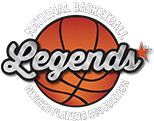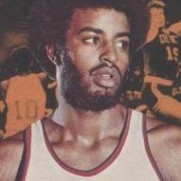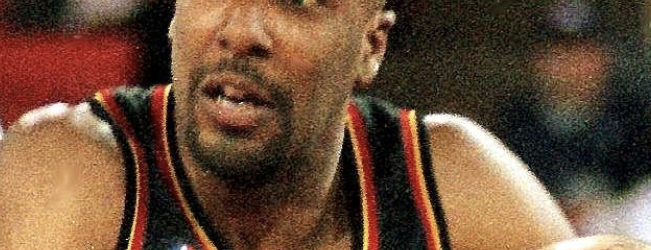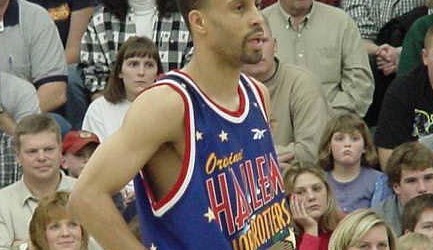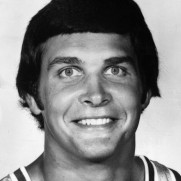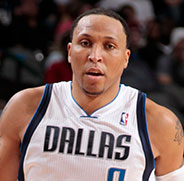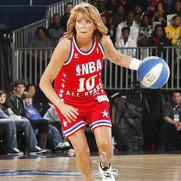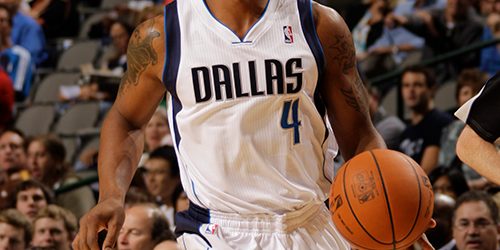A 6'9" power forward/center from Saint Joseph's University, Bantom won a silver medal at the 1972 Summer Olympics as a member ofthe United States national basketball team, who lost a controversial final game to the Soviet Union. He was selected by the Phoenix Suns with the eighth pick of the 1973 NBA draft, and he embarked upon a nine-year NBA (1973–82) career as a member of the Suns, Seattle SuperSonics, New York Nets, Indiana Pacers, and Philadelphia 76ers. He earned All-Rookie Team honors and ended his NBA career with 8,568 total points, 4,517 total rebounds, and 1,623 total assists. From 1982 until 1989, Bantom played professionally in Italy.
Since retiring as a player, Bantom has served as the licensing manager for NBA International, the NBA International director of marketing, the NBA senior vice president of player development, and the executive vice president of referee operations.
Bantom is a father of four children, three daughters and a son.
Clarence "Chucky" Brown Jr. (born February 29, 1968) was selected by the Cleveland Cavaliers in the second round of the 1989 NBA draft. Brown shares (with Joe Smith, Tony Massenburg, Jim Jackson, and Ish Smith) the NBA record for the most teams played for during his NBA career — twelve: the Cavaliers, Los Angeles Lakers, New Jersey Nets, Dallas Mavericks, Houston Rockets (where he became champion in 1994–95), Phoenix Suns, Milwaukee Bucks, Atlanta Hawks, Charlotte Hornets, San Antonio Spurs, Golden State Warriors, and Sacramento Kings. He retired with 4,125 career points.
In addition to the NBA teams, Brown had stints in the Continental Basketball Association and Italy's Panna Firenze. He played three games for Panna Firenze in 1992. The CBA saw Brown play for the Grand Rapids Hoops in 1993 and Yakima Sun Kings in 1994 and 1995. He became the second player to earn both an NBA ring and CBA ring in the same season.
Brown served as head coach of the World Basketball Association's Raleigh Knights during the summer of 2004, then served two seasons as an assistant coach for the Roanoke Dazzle of the NBA Development League. In 2006, Brown was named an assistant coach for the NBDL's Los Angeles D-Fenders,[2] and was then promoted to head coach for one season. Brown lives in Cary, North Carolina with his wife and three daughters.
Charles “Choo” Smith, Jr. affectionately known as “Choo” was born to Brenda and Charles H. Smith Sr. on November 30,1970 in West Baltimore.
Choo is a graduate of the prestigious City College High School and earned his Bachelor of Science Degree in Computer Science from his beloved University of the District of Columbia (UDC).
Choo attended Bowie State University in Maryland where he was the starting Point Guard position for the Bowie Bulldogs and after his first year was recruited by Mr. Will Jones, head coach of the UDC, Firebirds where he quickly earned the starting point guard position. As the leader of the team, the Firebirds went seven games over .500 for the first time in 10 years. Choo was honored for his exceptional basketball skills and finished his college career as the school’s all-time leader in Steals and Assists. During this time Choo was voted MVP of the team, he won The Pigskin Classic Award as the “Best Player” in the region and the Reslyn W. Henry Memorial Award. Charles “Choo” Smith graduated from the University of the District of Columbia with a Bachelor of Science Degree in Computer Science. Choo was inducted into the University of District of Columbia Athletic Hall of Fame in November 2015.
After college Choo was invited to the New York Knick Rookie Free Agent Training Camp. Choo outworked everyone to become in contention for a spot on the NY Knicks roster. Unfortunately the NBA Lockout took place and he did not get an opportunity to play for the Knicks. All was not lost, unbeknownst to Choo he was on the radar of the Harlem Globetrotters. Choo ultimately obtained his goal of playing basketball on the professional level by accepting a contract to play for the world-renowned Original Harlem Globetrotters. It is playing for the Harlem Globetrotters where he became a high-profile member of the team and was considered one of the best dribblers of all time. As a member of the Globetrotters, he served as an Advance Ambassador. Choo has played in all 50 States, in 26 countries.Choo carries the spirit of the Harlem Globetrotters in everything he does.
Upon retiring from the Harlem Globetrotters, Choo founded the non-profit organization Choo Smith Youth Empowerment, Inc which received it’s 501c3 designation in 2007. Choo Smith Youth Empowerment, Inc.focuses on Choo’s “4L” philosophy: “Love it, Learn it, Live it, Lead it.” It is from this organization that the Choo Smith Summer Basketball Camp was born and became the platform for many other initiatives under Choo Smith Youth Empowerment, Inc.
Choo’s ability to reach the youth is uncanny. He has the unique ability to reach youth on all levels; racial, socioeconomic background or gender and can generate results without compromising any of his beliefs. Choo is a man of ethics and his faith in Christ is applied in every aspect of his life. Over the years Choo has been featured on both local and national levels and in all media outlets (print, radio, and TV). Choo has appeared on all major television networks (ABC, NBC, CBS, and Univision) and appeared on Good Fellas of Baltimore, a Fox reality show, and the new ABC Reality show “Ball Boys.”
As a humanitarian, Charles “Choo” Smith has and continues to touch the lives of youth throughout Maryland and across the world. In the Summer of 2018 Choo became the Vice President of Basketball Operations for the Young 3 organization with retired NBA legend Jerome Williams. The Young 3 is the youth and community arm of the Big 3 Professional Basketball League founded by legendary rapper Ice Cube.
Choo has received numerous awards and recognitions for his work and service in the community with children and youth. Some of these awards and recognitions include:
- Requested to bring the Choo Smith Basketball Camp to the military bases throughout the US.
- Received the 2011 Presidential Volunteer Services Award
- Recipient of the 2012 Top 100 MBE Prestige Award
- Named Celebrity Spokesperson for International Rett Syndrome Foundation beginning in 2013.
- Current Education and Player Development Coordinator for Maryland District Amateur Athletic Association (2013 to present)
- Received the Community Hero Award from Dunkin Donuts (December,2013)
- Jersey Dedication Ceremony- Choo donated his official Harlem Globetrotter Jersey to his Alma Mater University of the District of Columbia (November 19, 2014) and Baltimore City College High School (2018)
- Inducted in the Class of 2015 University of the District of Columbia Athletic Hall of Fame
- 2015 William Donald Schaffer Helping Others Award presented by the State of Maryland Comptroller
- 2015 Inspiring Voices Award recipient presented by Community Law in Action organization
- 2015 Selected as one of the Spokespersons for Shooting for Peace
- One of the faces of the 2015-2017 and 2017-2019 Visit Baltimore Campaign
- Appointed to the National Basketball Retired Players Association (NBRPA) Task Force 2016
- National Basketball Retired Players Association Activities
- Appointed to the NBRPA’S Governors Committee (2016)
- 2017-2018 NBRPA President Search Committee (2016)
- Appointed as the VP for the Retired Harlem Globetrotters Association
- The 2016 Key Influencer Award and selected to fly with the Blue Angels
- Awarded twenty plus acres of land in Baltimore City – The Choo Smith aRise Baltimore CommuniVersity is a mixed used $120M project development will be completed in 2026. The Choo Smith CommuniVersity will be designed in a manner that will give the look and feel of a college campus. The ComuniVersity will give the visitor a feeling of exclusivity, community, fun and serenity.
- Recognized as one of the 2022 Fox 45 “Champions of Courage” Award
- Voted in as the Chairman of the Board for the National Basketball Retired Players Association in 2023 to Present
Outside of his professional endeavors, Choo is a proud father of three children: Ayanna, CJ, and Layla. As a native Baltimorean, Choo's love for his city and community has driven him to make a positive impact.
Charles "Choo" Smith Jr.'s basketball success, leadership, and dedication to youth and community empowerment have left an indelible mark. His passion for uplifting others continues to inspire young people and create lasting change in communities near and far.
It’s not often, if at all, that one can claim success in three distinct areas—professional sports, business and politics. Yet, Dave Bing did just that when he was elected the 62nd Mayor of the City of Detroit in May 2009 as part of a special election. A native of Washington, D.C., Bing is a graduate of Syracuse University where he earned his Bachelor of Arts in Economics, and was later bestowed an honorary Doctorate of Laws in 2006. He was also a standout basketball player and an All American in both high school and college.
Bing came to Detroit in 1966 when he was drafted by the Detroit Pistons as their No. 1 pick, and the second overall pick in the NBA draft that year. Unlike many first-year players, Bing’s transition to the NBA was an easy one. His 1,601 points earned him Rookie of the Year and further propelled him into NBA stardom.
Throughout his 12 seasons in the NBA, Bing averaged 20.3 points and 6 assists per game, appeared in seven All-Star Games and was named to the All-NBA First Team in 1968 and 1969. After spending the majority of his career with the Pistons, Bing did go on to play two years with the Washington Bullets and one year with the Boston Celtics. Bing hung up his sneakers at the conclusion of the 1977-78 season. He was inducted into the NBA Hall of Fame in 1990, as well as the the Michigan Hall of Fame in 1984.
Bing turned his winning strategies from the basketball court to the boardroom as the founder of an automotive supply corporation, The Bing Group in 1980, where he served as President and Chairman until April 2009. Bing realized yet another level of success in this role, as The Bing Group has been recognized around the country as a premier supplier of quality and uncompromised products and service. Within a decade, The Bing Group was recognized as one of the nation’s top Minority-Owned Companies by Black Enterprise. In the summer of 1999, he partnered with Ford Motor Co. to build the Detroit Manufacturing Training Center, a nonprofit facility to help prepare unemployed and under-employed workers to obtain jobs in the auto supply industry.
Answering yet another call to serve, Bing decided to run for Mayor of Detroit to help rebuild a city that he has loved and been a part of for more than 40 years. Proving that the basics of good performance, integrity and business can be applied to any area or industry, Bing has brought a renewed sense of trust and hope to the City of Detroit.
Poised to make the tough decisions, he has already begun to lay the groundwork for solid city government by instituting the toughest ethics ordinance in the city’s history. He and his team of professionals are also carefully analyzing ways to restructure operations to improve efficiency, and to tackle the city’s systemic issues.
Bing is married to Yvette Bing, with whom he has shared more than 23 years. He is also the proud father of three, and grandfather of four. He still enjoys tennis and golf, as much as his now demanding schedule will allow.
Rushia Brown was born in the Bronx, NY and raised in South Carolina and was one of the top student-athlete recruits in the state of South Carolina as a senior; being courted by esteemed universities such as Harvard, Duke University and her then dream school, the University of North Carolina-Chapel Hill. With the loss of her father, Rushia chose to stay close to home and attend Furman University.
As a Lady Paladin, Rushia pursued her education and competed on the court, attaining every accolade available including Southern Conference Freshman of the Year, multiple MVPs, Southern Conference Player of the Year, Edna Hartness Athlete of the Year and eventually having her jersey hang from the rafters as #34 was retired. Rushia’s collegiate years lead to a 10-year professional career overseas, which spanned 5 countries; Spain, France, Italy, Greece and Korea and 7 years in the WNBA; 6 years in Cleveland and 1 year in Charlotte.
Brown has made her mark in various sectors of business and continues to travel the world inspiring others to use their gifts and talents to pursue their dreams. Rushia spent 5 years as a WNBA executive. Her 1st experience was working in the NBA/WNBA front office in New York as a member of the Crossover Program. In 2018 Brown helped relocate the San Antonio Silver Stars to Las Vegas, where she served as the Player Programs & Franchise Development Manager for the Las Vegas Aces for 2 years. Brown then served as the Director of Community Relations and Youth Sports for the Los Angeles Sparks for 2 years. She also serves as a catalyst for change for those looking to take their lives and professions to the next level.
A former power forward/center in the National Basketball Association for the Los Angeles Lakers and Houston Rockets, Kupec was selected by the Los Angeles Lakers in the 4th round of the 1975 NBA Draft and was also selected by the Spirits of St. Louis in the fifth round of the 1975 ABA Draft.
After playing in the NBA, Kupec was a member of Olimpia Billy Milano, BredaBAU Bellinzona, Squibb Cantù (won Euroleague/Cup of Champions 1982), SAV Bergamo, Viola Reggio Calabria, Mister Day Siena and Spondilatte Cremona teams in Europe. He played college basketball and football at the University of Michigan, where he won Big 10 championships in both sports. Kupec attended Oak Lawn Community High School, where he played center at six-foot-eight, played football and earned High School All-America honors.
Shawn Dwayne Marion (born May 7, 1978) is an American retired professional basketball player who played 16 seasons in the National Basketball Association (NBA). In a career that spanned five teams, Marion earned NBA All-Star honors four times and won an NBA championship in 2011. Nicknamed "The Matrix" by TNT analyst Kenny Smith during the pre-season of his rookie year, he was widely regarded as one of the most versatile players in the league because of his athleticism and ability to play and defend many positions. He was also known for his unorthodox shooting form.
EARLY LIFE
Marion was born in Waukegan, Illinois and played high school basketball in Clarksville, Tennessee at Clarksville High School, where he was a teammate of future NBA player Trenton Hassell.
After high school, he played collegiate basketball at Vincennes University, a junior college in Indiana, for two years before transferring to the University of Nevada, Las Vegas in 1998. In his second year with Vincennes, Marion played 36 games and averaged 23.5 points and 13.1 rebounds. He was also the 1998 NJCAA Male Student Athlete of the Year.
NBA CAREER
Phoenix Suns
Shawn Marion played for the Phoenix Suns from 1999 to 2008.
Marion was selected by the Suns in the first round and ninth overall in the 1999 NBA draft. Showing explosive scoring potential and double-digit rebounding ability by his sophomore season, he was selected to the Western Conference All-Star team for the first time in 2002–03 season. In 2004 he was selected to the US Olympic men's basketball team.
In 2005, Marion was named a reserve on the Western Conference All-Star Team and selected to the 2004–05 All-NBA Third Team. That year he became the first player since David Robinson in 1991–92 to average in the top five in rebounding and steals since the league began tracking steals in 1973, a feat he repeated in 2005–06. During the 2005 All-Star Weekend, Marion teamed up with WNBA Rookie of the Year Diana Taurasi of the Phoenix Mercury, and Suns legend Dan Majerle in the RadioShack Shooting Stars to run away with the title. Marion was also selected as a Western Conference reserve on the 2006 All-Star team, and the 2007 All-Star team.
The 2005–06 NBA season was perhaps the best season of his career. He was the only player in the NBA ranked in the top 20 in points, rebounds, steals, blocks, field goal percentage and minutes. He finished the season leading the Suns in points per game (21.8), rebounds per game (11.8), blocks per game (1.7), and steals per game (2.0). Marion also ranked 3rd in efficiency. He helped fill in the void left by star Amar'e Stoudemire, who missed nearly the entire season due to injury. Marion also earned a spot in the NBA All-Star Game for the third time.
During the 2006–07 season, only Marion and superstar Kevin Garnett ranked in the top 40 in points per game, rebounds per game, field goal percentage, blocks per game, steals per game, and minutes per game. He was named to his fourth NBA All-Star Team and collected 18 points, eight rebounds, four assists and two steals in 22 minutes in his hometown of Las Vegas at the 2007 contest.
Following a summer filled with rumors and trade speculation involving possible deals with the Boston Celtics, Los Angeles Lakers, and Utah Jazz, Marion requested a move. Citing the rumors and a refusal on the part of Phoenix management to negotiate a contract extension, Marion called his relationship with the Suns a "bad marriage", and stated in September 2007 it was time for him to leave Phoenix. By the start of the season, though, Marion continued to play well for the Suns.
Miami Heat
On February 6, 2008, the Phoenix Suns traded Shawn Marion and teammate Marcus Banks to the Miami Heat for center Shaquille O'Neal. His last basket with the Heat was a game-winning dunk against the Chicago Bulls.
Toronto Raptors
On February 13, 2009, Marion was traded to the Toronto Raptors along with Marcus Banks and cash considerations for Jermaine O'Neal, Jamario Moon and a future conditional draft pick.
Dallas Mavericks
On July 9, 2009, Marion signed a five-year $39 million contract and was immediately traded to the Dallas Mavericks as part of a four-team swap among Raptors, Mavericks, Memphis Grizzlies and Orlando Magic. He won the first championship of his career in the 2010–11 season when the Dallas Mavericks defeated the Miami Heat 4–2 in the 2011 NBA Finals.
On April 13, 2011, Marion became the fifth man to compile 1,500 steals and 1,000 blocks in the NBA. He joined Hakeem Olajuwon, Karl Malone, Kevin Garnett and Julius Erving in the exclusive club.
In the 66 game 2011–12 season, Marion led Dallas in rebounding with 7.4 rebounds per game. Marion was the only player in the NBA 6-foot-7 or shorter to lead his team in rebounding in 2011–12. He also led Dallas in double-doubles with 12. Marion scored 29 points against his former team, the Phoenix Suns, on January 23, 2012, which tied his highest-scoring game as a Maverick. Marion moved into 100th place on the NBA's all-time scoring list on March 3.
Marion appeared in his 1,000th career regular-season game against the Suns on December 27, 2012. In January 2013, Marion was fined $25,000 by the NBA for publicly criticizing officiating. After an overtime loss to the Oklahoma City Thunder, he said, "It's hard to beat anybody when you're playing five on eight." Marion passed Rod Strickland for 25th place on the NBA's all-time steals list on March 6, 2013. Marion led the Mavericks in rebounds again with 525 (7.8 per game).
On January 3, 2014, he passed the 17,000-point mark and joined Olajuwon, Malone and Garnett as the only players with at least 17,000 points, 9,000 rebounds, 1,500 steals and 1,000 blocks.
Cleveland Cavaliers
On September 9, 2014, Marion signed with the Cleveland Cavaliers. On December 26, 2014, he recorded his 10,000th career rebound in a 98-89 win over the Orlando Magic. In January 2015, Marion announced his intention to retire at the end of the 2014–15 season.
After missing 13 straight games with a strained left hip, Marion returned to action on March 16 against the Miami Heat. In eight minutes off the bench, he recorded five points and one rebound in the 92-106 loss.
Retirement
On June 18, 2015, following the Cavaliers' NBA Finals loss to the Golden State Warriors, Marion announced his retirement from the NBA after 16 seasons.
National Team Competition
Marion played for the senior United States national team in the 2002 FIBA World Championship and the 2004 Athens Olympics. He was named to the 2006 USA men's senior national team but he was forced to withdraw before the tournament began due to a knee injury. The squad finished third in the 2006 FIBA World Championship without him.
Nicknamed "Lady Magic", Nancy Lieberman is an American former professional basketball player and coach in the Women's National Basketball Association (WNBA) who is currently a broadcaster for the Oklahoma City Thunder of the National Basketball Association (NBA) as well as the head coach of Power, a team in the BIG3 which she led to its 2018 Championship. Lieberman is regarded as one of the greatest figures in American women's basketball.
In 2000, she was inducted into the Nassau County Sports Hall of Fame. Lieberman is a member of the Naismith Memorial Basketball Hall ofFame, the Women's Basketball Hall of Fame the St. Louis Jewish Sports Hall ofFame, and the Virginia Sports Hall of Fame.
In July 2015, she was hired by the Sacramento Kings as an assistant coach, becoming the second female assistant coach in NBA history. She took two leaves of absence to care for her ailing mother before leaving the Kings in 2017. After the Kings, she became a broadcaster with the New Orleans Pelicans.
Butler, an NBA Champion (2011) and two-time NBA All-Star (2007, 2008), recorded a career spanning 14 seasons, including stints with the Miami Heat (2002-04), Los Angeles Lakers (2004-05), Washington Wizards (2005-10), Dallas Mavericks (2010-11), Los Angeles Clippers (2011-13), Milwaukee Bucks (2013-14), Oklahoma City Thunder (2014), Detroit Pistons (2014-15) and Sacramento Kings (2015-16). Since retiring from the league, Butler has made regular appearances on NBA-TV, ESPN and Fox Sports. In addition to television broadcasting, he has continued to grow his personal brand, Tuff Juice, through a series of podcast and content offerings.
Eddie Gill played college basketball at the College of Eastern Utah, Salt Lake Community College, and Weber State University. With the Weber State Wildcats, Gill was MVP of the 1999 Big Sky Conference tournament.
Not selected in the 2000 NBA draft, Gill began his professional career with the Las Vegas Silver Bandits of the IBL and debuted with the New Jersey Nets of the NBA late in the 2000–01 season. Gill has had a journeyman career in basketball and has played in various teams in the NBA, NBA Development League, minor leagues, and overseas. In the NBA, Gill has played for the New Jersey Nets, Memphis Grizzlies, Portland Trail Blazers, Indiana Pacers, Seattle SuperSonics, and Milwaukee Bucks all usually in reserve roles. However, Gill has been a starter and high scorer for much of his non-NBA career. Professionally, Gill has been an All-Star selection in the CBA (2004) and NBA Development League (2008) and won championships with the D-League (2009 with the Colorado 14ers) and Belgian Cup (2010 with BC Oostende).
Gill also won a regional Emmy award for his work as an analyst on Pacers Live Pregame.
Bob Elliot was a three-time academic and athletic All-American at the University of Arizona, leading his team to a Western Athletic Conference championship and two NCAA tournament appearances. He was a 1977 Third Team All American, a 1975, 1976 and 1977. Third Team All-WAC conference honoree, and a 1975, 1976, and 1977 Academic All American. Elliott received a Bachelor of Science in accounting, and later, an MBA from the University of Arizona as well.
He is also a past chairman of the NBRPA. Elliott was drafted by the Philadelphia 76ers of the NBA, but never played for them. He spent half a year playing basketball in Europe and three seasons with the New Jersey Nets. Following his NBA career, Elliott briefly played for the Detroit Spirits of the Continental Basketball Association during the 1982–83 season.
Elliott currently resides in Tucson, Arizona. He and his wife Beverely have four adult children and ten grandchildren. Elliott also owns a successful accounting practice, Elliott Accounting Group, in Tucson that has been active for over 30 years.
Spencer Haywood is an Olympic gold medalist and a member of the Naismith Memorial Basketball Hall of Fame, being inducted in 2015. Haywood attended Trinidad State Junior College in Trinidad, Colorado, during the 1967–68 college season, where he averaged 28.2 points and 22.1 rebounds per game. Due to his exceptional performance and talent, Haywood made the 1968 U.S. Olympic team at age 19, becoming the youngest American basketball player in Olympic history. Haywood was the leading scorer on the gold medal winning team at 16.1 points per game, and he set a Team USA field goal percentage record of .719.
Haywood transferred to the University of Detroit in the fall of that year and led the NCAA in rebounding with a 21.5 average per game while scoring 32.1 points per game during the 1968–69 season.
Haywood decided to turn pro after his sophomore year, but National Basketball Association (NBA) rules, which then required a player to wait until four years after his high school class graduated, prohibited him from entering the league. The American Basketball Association (ABA) had a similar rule, but league executive Mike Storen came up with the idea for a hardship exemption. With his mother raising 10 children while picking cotton at $2 per day in Mississippi, Haywood met the criteria. He joined the Denver Rockets after they selected him in the ABA draft.
In his 1969–70 rookie season, Haywood led the ABA in both scoring at 30.0 points per game and rebounding at 19.5 rebounds per game, while leading the Rockets to the ABA's Western Division Title. In the playoffs, Denver defeated the Washington Caps in 7 games in the Western Division Semifinals before falling to the Los Angeles Stars in the division finals, 4 games to 1. He was named both the ABA Rookie of the Year and ABA MVP during the season and became the youngest ever recipient of the MVP at the age of 21. His 986 field goals made, 1,637 rebounds, and 19.5 rebound per game average are the all-time ABA records for a season. Haywood also won the ABA's 1970 All-Star Game MVP that year after recording 23 points, 19 rebounds, and 7 blocked shots for the West team.
In 1970, despite the NBA's eligibility rules, Haywood joined the Seattle SuperSonics, and with SuperSonics owner Sam Schulman launched an antitrust suit against the league (Haywood v. National Basketball Association). The case went all the way to the U.S. Supreme Court before the NBA agreed to a settlement. The suit and its impact on college basketball and the NBA was the focus of a 2020 book The Spencer Haywood Rule: Battles, Basketball, and the Making of an American Iconoclast by Marc J. Spears and Gary Washburn.
Haywood was named to the All-NBA First Team in 1972 and 1973 and the All-NBA Second Team in 1974 and 1975. Haywood's 29.2 points per game in the 1972–73 season and 13.4 rebounds per game in 1973–74 are the single-season record averages for the SuperSonics for these categories. Haywood played in four NBA All-Star Games while with Seattle, including a strong 23-point, 11-rebound performance in 1974. In the 1974–75 season, he helped lead the SuperSonics to their first playoff berth. Overall, during his five seasons with Seattle, Haywood averaged 24.9 points per game and 12.1 rebounds per game.
In 1975, the SuperSonics traded him to the New York Knicks where he later teamed with Bob McAdoo. Haywood later played for the New Orleans Jazz, Los Angeles Lakers, and Washington Bullets.
